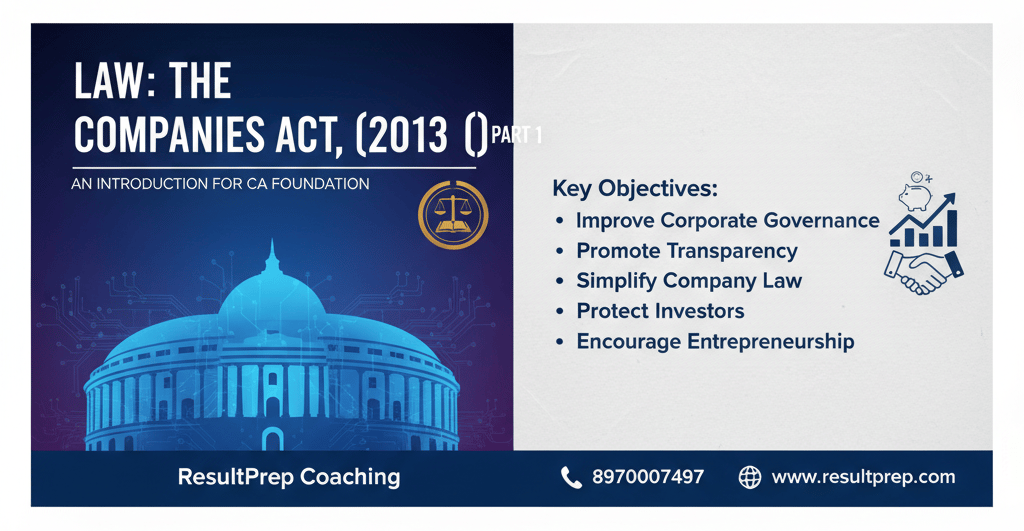The Companies Act, 2013 Made Simple: A Must-Read for CA Foundation Students (Part 1)
Master the basics of India’s most important corporate law — The Companies Act, 2013! 📘 Learn its background, objectives, key definitions, and features explained in a simple, exam-oriented way. Perfect for CA Foundation aspirants who want conceptual clarity, scoring tips, and real-world insights into company law. 💼
CA FOUNDATION
10/9/20253 min read


Law: The Companies Act, 2013 (Part 1): An Introduction for CA Foundation
Introduction
The Companies Act, 2013 is one of the most important laws governing business organizations in India. It forms the backbone of corporate regulation, defining how companies are formed, managed, and dissolved. For students preparing for the CA Foundation exam, understanding the Companies Act is crucial—not only because it forms a major part of the Business Laws syllabus but also because it builds the base for advanced corporate law studies in later CA levels.
In this blog, we’ll explore the background, objectives, key features, and scope of the Companies Act, 2013 in a way that’s simple, clear, and exam-oriented.
Background of the Companies Act, 2013
Before 2013, company law in India was governed by the Companies Act, 1956. Over time, that Act became outdated due to rapid changes in technology, globalization, and corporate governance practices. To modernize the framework, the Companies Act, 2013 was enacted and came into force on August 29, 2013.
This Act introduced new provisions for transparency, accountability, and investor protection. It also aligned Indian corporate laws with international standards, ensuring ease of doing business and promoting corporate ethics.
Objectives of the Companies Act, 2013
The key objectives of the Act are:
To improve corporate governance: Ensuring that companies are managed responsibly and ethically.
To promote transparency and accountability: Requiring companies to disclose their operations, finances, and decisions clearly.
To simplify company law: Making the process of formation, management, and winding up more efficient.
To protect investors’ interests: Providing mechanisms for grievance redressal and fraud prevention.
To encourage entrepreneurship: By allowing easier incorporation and compliance for small companies and startups.
These objectives make the Act student-friendly for understanding both the legal and practical sides of business operations.
Scope and Coverage
The Companies Act, 2013 consists of 29 Chapters, 470 Sections, and 7 Schedules. It covers the entire lifecycle of a company—from incorporation to winding up.
Some of the major areas it governs include:
Formation and Incorporation of Companies
Share Capital and Debentures
Management and Administration
Accounts, Audit, and Financial Statements
Corporate Social Responsibility (CSR)
Mergers, Amalgamations, and Acquisitions
Oppression and Mismanagement
Winding Up of Companies
Each of these topics is covered in detail in the CA Foundation Business Laws syllabus, making it vital to build conceptual clarity from the beginning.
Key Definitions and Concepts
To understand the Act, you must know a few basic definitions:
Company [Section 2(20)]: A company incorporated under the Companies Act, 2013 or any previous company law.
Private Company [Section 2(68)]: A company that restricts share transfer, limits the number of members to 200, and prohibits public subscription of shares.
Public Company [Section 2(71)]: A company that is not a private company and can invite the public to subscribe to its shares.
One Person Company (OPC) [Section 2(62)]: A company that has only one person as its member.
Limited Liability: The liability of shareholders is limited to the amount unpaid on their shares.
For CA Foundation exams, it’s essential to memorize these definitions and understand the differences between company types.
Important Features of the Companies Act, 2013
The 2013 Act introduced several reforms that made company regulation more effective:
One Person Company (OPC): Introduced to encourage solo entrepreneurs to start businesses with limited liability.
Corporate Social Responsibility (CSR): Made it mandatory for certain companies to spend a portion of their profits on social causes (Section 135).
Enhanced Auditor Accountability: Auditors are now held liable for fraud or misconduct.
Simplified Company Incorporation: The SPICe+ (Simplified Proforma for Incorporating Company Electronically) form allows easy online registration.
Class Action Suits: Shareholders and depositors can file cases against fraudulent or oppressive management.
Independent Directors: To ensure unbiased decision-making in large companies.
These reforms modernized corporate law in India, making it student-relevant for exams and practical knowledge alike.
Importance for CA Foundation Students
The Companies Act, 2013 is a scoring area if studied strategically. Questions in the Business Laws paper often test conceptual understanding, definitions, and application-based case scenarios.
Tips for CA Foundation aspirants:
Learn important sections and definitions with examples.
Prepare short notes for each chapter for quick revision.
Practice MCQs and case-based questions to build application skills.
Understand the logic behind each provision rather than rote learning.
The Companies Act also helps students develop a legal mindset—an essential skill for higher levels like CA Intermediate and Final.
Real-Life Applications
Understanding company law isn’t just about passing exams—it’s essential in the real world:
Chartered Accountants deal daily with company incorporation, audits, and compliance.
Entrepreneurs use this knowledge to legally manage startups.
Investors use it to assess company credibility and governance.
Hence, studying the Companies Act connects theory with practical business realities.
Conclusion
The Companies Act, 2013 lays the foundation for India’s modern corporate framework. For CA Foundation students, mastering this Act is the first step toward becoming a competent professional who understands both the law and the logic behind business operations.
In the next part, we’ll cover the types of companies, incorporation procedures, and memorandum and articles of association, helping you dive deeper into the Act’s core provisions.
At ResultPrep Coaching, we simplify complex legal concepts with examples, case studies, and visual aids so students can grasp them easily and score high in exams.
📞 Call: 8970007497
🌐 Visit: www.resultprep.com
Prepare for the best results!
Achieve your goals with expert coaching and support from ResultPrep.
Contact us:
© 2025. All rights reserved.
Address:
GSS Complex, 2nd Floor,
16th Cross Rd, HMT Layout, Vidyaranyapura, Bengaluru, Karnataka- 560097
